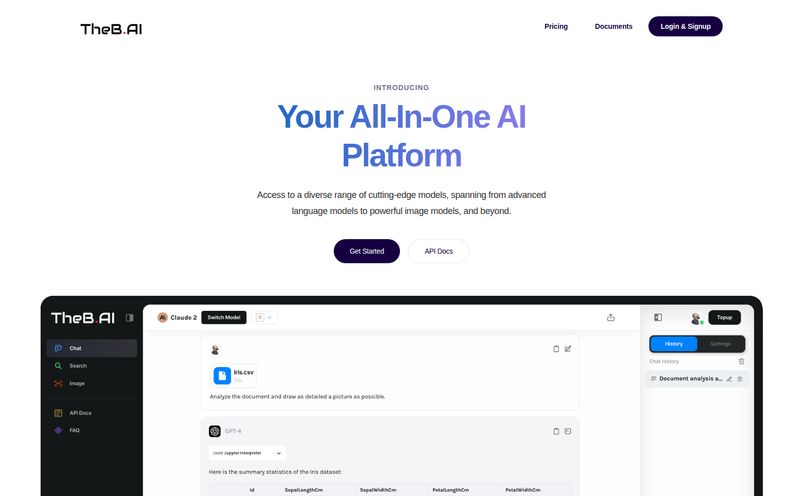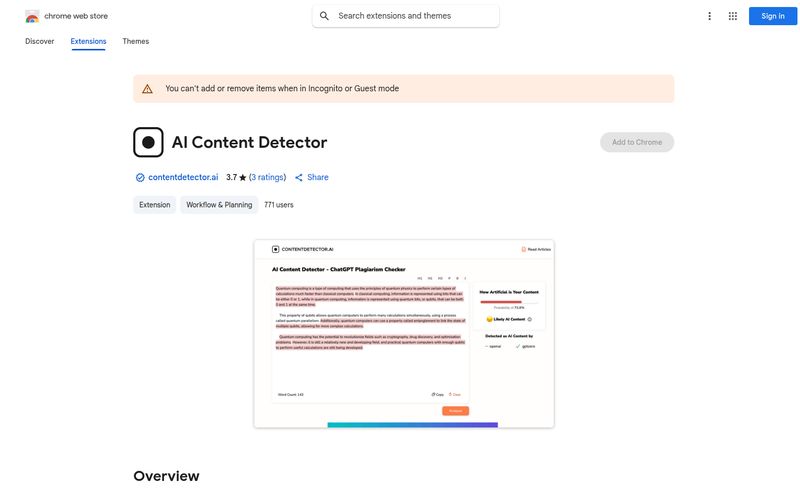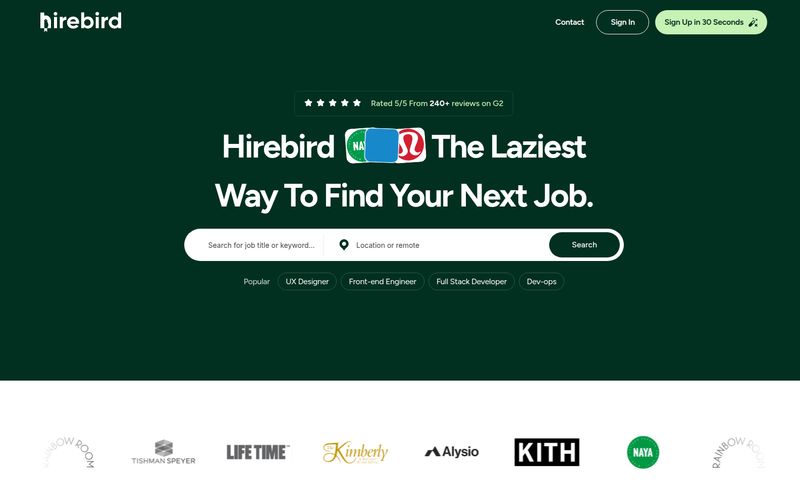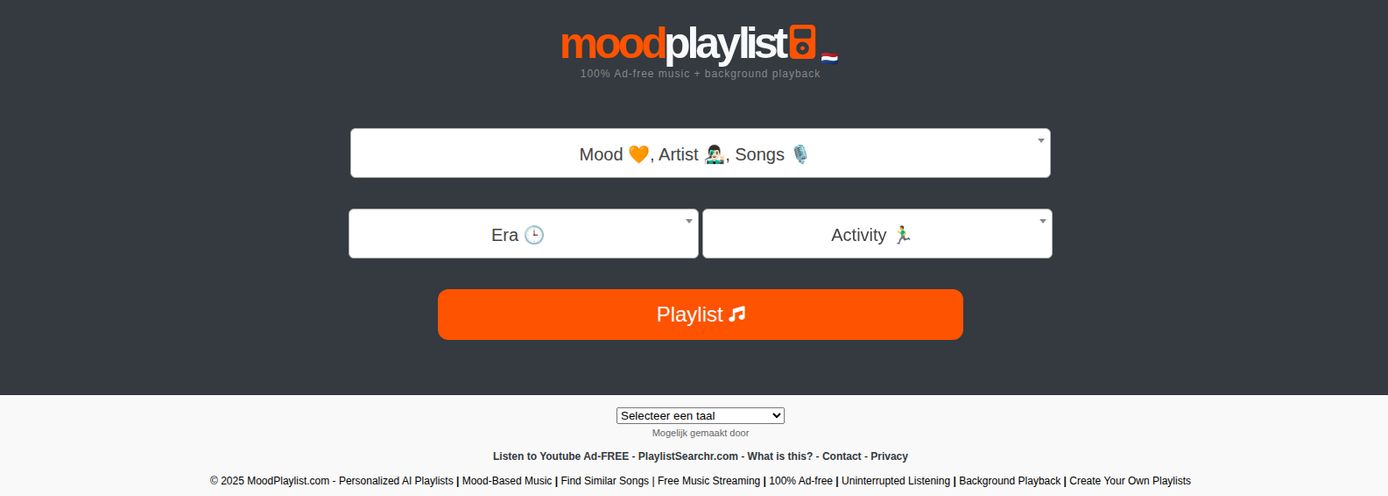We've all been there. That little nagging voice in the back of your head. You're dating someone new, and it's going great, but you can't help but wonder... are they still swiping? Or maybe it’s an ex you’re curious about. It's a modern dating dilemma, born from a world of ghosting and endless options. And into this pit of uncertainty steps a tool with a name that’s, well, pretty on the nose: CheatEye.
I've been in the SEO and online trends game for years, and I’ve seen dozens of these “people-finder” tools pop up. They promise the world—instant answers, secret knowledge, peace of mind. Most are clunky databases that just scrape public data. But CheatEye claims to be different. It's slick, it talks about AI, and it focuses on the white whale of dating app snooping: Tinder.
So, does it live up to the hype? Or is it just another digital rabbit hole? Let's take a look.
So What Exactly Is CheatEye?
At its core, CheatEye presents itself as a specialized search engine for Tinder. Forget Google. This tool claims it can plug directly into Tinder's data, using AI to find a specific person's profile based on just a name, age, and location. Think of it like a private investigator for the dating app world, one that works instantly from your browser.
The entire premise is built on discretion. You don't need to log in, you dont need a Tinder account, and the person you're searching for will supposedly never know. It promises to pull back the curtain and show you not just if a profile exists, but a whole dossier of information. It's the kind of tech that feels straight out of a movie, which always makes my inner skeptic raise an eyebrow.
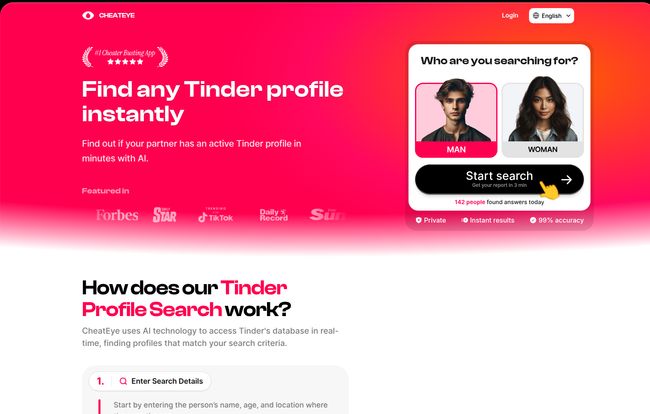
Visit CheatEye
How It Supposedly Works
The process, as laid out on their site, is deceptively simple. You pop in the details of the person you're looking for, hit 'Start Search', and their AI allegedly gets to work. It sifts through Tinder's profiles in real-time and, within moments, presents you with a report. Simple. Maybe a little too simple?
According to them, the report isn't just a yes/no answer. They claim to provide:
- Full Profile Details: The bio, photos, and other information exactly as it appears on their Tinder profile.
- Last Activity Data: This is the kicker. It claims to show you when they last used the app, even pinpointing the location.
- Subscription Info: It even says it can tell if the person is paying for premium features like Tinder Gold or Tinder Plus. Now that’s granular.
This level of detail is what sets its claims apart from generic people search sites. It’s not just finding a profile; it’s assessing its activity. It's the difference between knowing a car exists and knowing when it was last driven.
The Features That Catch Your Eye
AI-Powered Searching
CheatEye talks a lot about its “AI-powered” technology. In practice, this seems to refer to its ability to conduct “smarter searches.” For instance, if you search for “Mike” but the profile is under “Michael,” the system is supposedly smart enough to make that connection. It also claims to handle age variations, which is useful since, let's be honest, people fudge their age on dating apps all the time. It’s a neat feature, assuming it works as advertised.
The All-Important Detailed Reports
The real product here is the report. Seeing the last time someone was active on Tinder is powerful information. It's the kind of data that could either bring immense relief or, you know, start a very, very awkward conversation. The claim about seeing their subscription status is also interesting; it suggests a deeper level of access than I’d expect.
Okay, But Does This Thing Actually Work?
Here's where my professional skepticism really kicks in. How, exactly, is CheatEye accessing Tinder's database in real-time? Most major platforms, like Tinder (owned by Match Group), have a pretty locked-down API. They don't just let third-party services ping their servers and pull user data willy-nilly. Doing so would be a massive privacy violation and a technical nightmare.
Their website boasts some impressive stats—“+51% New Profiles Found” and “140K+ Searches Completed”—but provides no context. The most likely method is through sophisticated web scraping, which, while not always illegal, is almost certainly against Tinder's Terms of Service. This means the service exists in a perpetual gray area. It also means it could break at any moment if Tinder updates its code.
“In my experience, when a tool makes big claims about accessing a closed ecosystem like Tinder, you have to take it with a grain of salt. It might work today, but it could be gone tomorrow.”
So, can it work? Possibly. Is it a stable, 100% reliable method? I have my doubts. The accuracy of that “last seen” data is particularly questionable.
Let's Have the Awkward Talk About Ethics
We can't talk about a tool called CheatEye without talking about the ethics of it all. It's designed for one purpose: to check up on someone without their consent.
Privacy for Whom?
The site hammers home that it's “100% Private & Secure”... for the searcher. And that's great. But it completely ignores the privacy of the person being searched for. It’s a tool that, by its very nature, operates on a foundation of secrecy and potential mistrust. Before you even type a name into that search bar, you're opening a kind of Pandora's Box in your relationship. What you find—or don't find—could change things forever.
I'm not here to judge. The heart wants what it wants, and sometimes the heart wants answers. But it's a slippery slope. Today it's a Tinder search, tomorrow you're trying to crack their email password. It’s a path that rarely leads to a healthy place.
What's the Price of Peace of Mind (or Paranoia)?
Here’s a classic red flag for me. I scoured the CheatEye homepage, and you know what I couldn’t find? A price. There's no “Pricing” link in the main navigation. This is a common tactic designed to get you invested in the process before you see the cost. You'll likely enter all the information, get teased with a “we found a match!” notification, and then hit a paywall.
Expect a per-search fee or a subscription model. Be prepared for that before you start, so you can decide if the potential answer is worth the price they eventually reveal.
The Good, The Bad, and The Ethically Murky
To put it all in one place, here's how I see it breaking down.
| The Good Parts (The Appeal) | The Not-So-Good Parts (The Red Flags) |
|---|---|
| Seems very easy to use. No technical skill required. | The legality is highly questionable and likely violates Tinder's TOS. |
| Promises anonymity for the person searching. | Serious ethical concerns about privacy and consent. |
| The potential to get detailed info, like activity status, is a huge draw. | Claims about accuracy and real-time data are unverified and might be exaggerated. |
| Doesn't require you to have your own Tinder account. | Lack of transparent pricing is a major turn-off. |
FAQs about CheatEye
- 1. Is it legal to use CheatEye?
- This is a legal gray area. While you probably won't get in trouble for using it, the service itself is very likely violating Tinder’s terms of service by scraping their data. It's not a risk-free environment.
- 2. How accurate is the profile information?
- CheatEye claims it's highly accurate and in real-time. However, without independent verification, it's wise to be skeptical. Data scraping can lead to outdated or incomplete information.
- 3. Do I need to provide my own Tinder login?
- No. The service advertises that no login is required, which is one of its main selling points for privacy-conscious searchers.
- 4. Will the person I search for find out?
- According to CheatEye, the entire process is anonymous and undetectable. The person being searched will not receive any notification.
- 5. What kind of info can I really get?
- It claims to provide the user's full profile, photos, bio, last known location when using the app, and even if they have a paid Tinder subscription.
Final Thoughts: A Tool or a Trap?
Look, I get the appeal of CheatEye. I really do. It offers a simple answer to a complicated, emotionally charged question. The technology, if it works as described, is impressive in a slightly scary way. It’s a testament to how much of our lives are now searchable, quantifiable, and, well, checkable.
But it's a tool that walks a very fine line. It exists in the murky space between technical possibility and ethical responsibility. Using it might give you the answer you're looking for, but it might also erode the very trust you’re trying to verify. Sometimes, the old-fashioned way—a direct, honest conversation—is still the best tool in the box.
If you do decide to use a service like this, go in with both eyes open. Understand the risks, question the data, and be prepared for whatever you might find. Curiosity is a powerful thing, but it's not always our best guide.
Reference and Sources
CheatEye Official Website: Information and claims sourced directly from their promotional materials.
Tinder Terms of Use: https://policies.tinder.com/terms/us/en (Specifically regarding rights you grant Tinder and restrictions on using the service).
